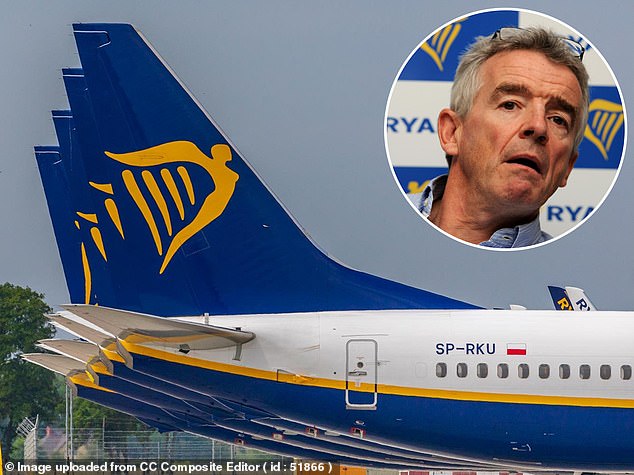Table of Contents
- Ryanair reported that its profits fell to €1.8 billion in the six months ending in September
- It cut average airfares by 10% to €52 due to consumer spending pressures.
Ryanair reported lower first-half profits after cutting ticket prices in response to a subdued consumer environment.
Profits at Europe’s largest airline fell 18 percent to 1.8 billion euros in the six months ended September, even though total passenger numbers rose by about 10 million to 115.3 million.
It cut average airfares by 10 percent to 52 euros due to consumer spending pressures and fewer bookings through online travel agents ahead of the recent peak summer season.
Lower profits: Ryanair, whose chief executive is Michael O’Leary (above right), reported that its profits fell 18 percent to 1.8 billion euros in the six months to the end of September.
As a result, the company’s forecast revenue fell 2 percent to €5.95 billion, although strong reserved seating and in-flight sales boosted its total revenue by 1 percent to €8.7 billion.
“Many customers are switching to Ryanair because of our lower airfares,” said Ryanair CEO Michael O’Leary. “As a result, we are achieving record share gains in most markets.”
However, operating expenses rose 8 percent to 6.7 billion euros, partly due to personnel costs and airport and handling charges each increasing by more than 100 million euros, as well as delays in the delivery of Boeing aircraft.
Current strikes by Boeing workers in the United States over pay have delayed the arrival of nine B737 Gamechanger aircraft for Ryanair.
While the Dublin-based company expects these aircraft to be delivered in the fourth quarter of the financial year, it warned that the risk of “further delivery delays remains high”.
It has therefore reduced its 2026 traffic growth target by 5 million to 210 million passengers to “avoid overscheduling, overcrewing and excessive costs.”
Ryanair’s revised results and outlook come just days after O’Leary warned the airline would cut flights to and from UK airports by 10 per cent.
He said Chancellor Rachel Reeves’ “idiotic decision” to increase taxes in last week’s Budget on airline tickets will make air travel “much more expensive” for tourists and make the UK less competitive. .
The UK Government announced that rates for passengers on short-haul economy flights would rise by between £2 and £15 from 2026/27, while private jet users will face a 50 per cent rise in fees. rates they pay.
O’Leary said: ‘As an island economy on the periphery of Europe, it is vital that the UK reduces air access costs.
‘If Labor is serious about its ambitions to generate growth, it should start by scrapping the APD. Instead, his first budget has hurt growth, hurt tourism, and hurt air travel.’
Ryanair expects to carry between 198 million and 200 million passengers this fiscal year, depending on “current Boeing delivery delays not worsening.”
Additionally, he said advance bookings indicate strong sales in the third quarter, while price reductions “appear to be moderating.”
Susannah Streeter, head of money and markets at Hargreaves Lansdown: “The worst of the caution appears to be easing, with falls in average rates moderating and some strong forward booking trends emerging.
“But achieving a significant performance increase from now on, given that capacity issues have not yet been resolved, may still be a challenge.”
Wizz Air also published a trading update on Monday, which showed it carried 5.6 million passengers in October, an increase of 4.3 percent on the same month last year.
DIY INVESTMENT PLATFORMS

AJ Bell

AJ Bell
Easy investing and ready-to-use portfolios

Hargreaves Lansdown

Hargreaves Lansdown
Free Fund Trading and Investment Ideas

interactive inverter

interactive inverter
Fixed fee investing from £4.99 per month

sax

sax
Get £200 back in trading fees

Trade 212

Trade 212
Free trading and no account commission
Affiliate links: If you purchase a This is Money product you may earn a commission. These offers are chosen by our editorial team as we think they are worth highlighting. This does not affect our editorial independence.


